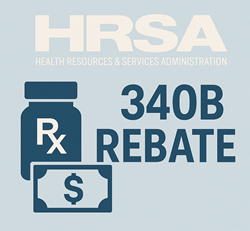340B Rebate Model Pilot Program

On July 31st, HRSA released a program notice regarding a 340B Rebate Model Pilot Program. The pilot program is only for the drugs selected under the Medicare Drug price Negotiation Selected Drug List for 2026, and will not be applicable to most manufacturers. HRSA’s goal of the pilot program is to assess the “merits and shortcomings of the rebate model from the perspective of affected stakeholders” as well as to “help shape the future of 340B rebate models”. The program is set to last for a minimum of 1 year and is only open to the following drugs:
- ELIQUIS
- ENBREL
- ENTRESTO
- FARXIGA
- IMBRUVICA
- JANUVIA
- JARDIANCE
- NOVOLOG
- STELARA
- XARELTO
Comments are due no later than September 2, 2025. For pilot-eligible manufacturers notice of participation must be submitted to 340BPricing@hrsa.gov no later than September 15, 2025. All pilot program approvals will be made by October 15, 2025, for a January 1, 2026 effective date.
Thoughts
- The timing of this guidance corresponds with the recent HRSA lawsuits as well as the 2026 Physician Fee Schedule Guidance. In regards to the Physician Fee Schedule Guidance, HRSA makes reference to the fact that they are attempting to limit “Maximum Fair Price (MFP) deduplication” as well as address the “340B Medicaid duplicate discounts”. This acknowledges to a degree that HRSA is aware of manufacturers' concern about the current program's ability to prevent duplicate discounts.
- The general requirements establish that manufacturers will not pass any IT-related costs to covered entities, and they should create a support mechanism to assist the covered entities in navigating the rebate process. Based on these requirements, I do not think this creates any additional burden for manufacturers, especially those that have commercial rebate agreements with PBMs. Manufacturers should expect additional operational time spent because most covered entities will not be accustomed to the rebate process.
- The reporting timeline is 45 days “with allowances for extenuating circumstances and other exceptions, including adjustments when a 340B status change occurs on a claim”. Generally speaking this timing is fairly standard across data submissions at both the GPO and PBM level; however, manufacturers should be prepared for delays. The proposal is clearly creating leeway for covered entities to struggle gathering and submitting data.
- HRSA expects that rebates will be paid within 10 days of data submission from the covered entities. This is going to create a large operational lift for manufacturers to validate the data and submit everything in time for payment processing, and is even shorter than the 14 days MFP refunds are expected within. I expect this will be an area where HRSA receives numerous comments from manufacturers attempting to lengthen the payment terms.
- HRSA states that they expect rebate claims not to be denied for “compliance concerns with diversion or Medicaid duplicate discounts”. While I understand why HRSA would include this language, it seems one-sided and goes against the stated goals of deduplication of MFP discounts and Medicaid 340B duplicate discounts. The data requirements (more on that next) do not have a field to dispute, so it appears that HRSA is not expecting any disputes from manufacturers. I expect commentary from manufacturers on this topic as well.
- The data requirements are minimal, and manufacturers should be able to leverage many key fields from other data sets. For example, there is a field for Script Number which could be potentially bridged to existing commercial and government rebate data. Again, the concern with the data is not the requested fields, but rather the quick turnaround time for validation.
Next Steps
The rebate pilot program is a step in the right direction by HRSA. In an ideal world expanding the pilot program to a more diverse subsection of manufacturers would be preferred; however, it is a reasonable first step for HRSA and 340B entities to take. There are definitely some concerns about the operational components of the pilot that hopefully will be addressed in the comment period, however, HRSA noted that while they are accepting comments, they are under no obligation to respond to or act on the comments. Since most manufacturers will not be part of the pilot program what steps can you take:
- Determine if you are going to comment on any of the program components – it is important for HRSA to hear from manufacturers of all sizes. The rule, as it is written now, would create operational scenarios that would be hard for many manufacturers to implement.
- Review the data format and timing components – not participating in the pilot creates an opportunity for manufacturers to build simulated bridges back to their other data sets. When HRSA publishes their results you will have a better understanding of how your organization would utilize the data.
- Evaluate your IT and reporting capabilities – if HRSA were to expand the pilot and add new products in the future, would your existing team be able to manage or would you need to identify a third party or system to meet the requirements?
Published on Aug. 11, 2025 by Scott Hoffman